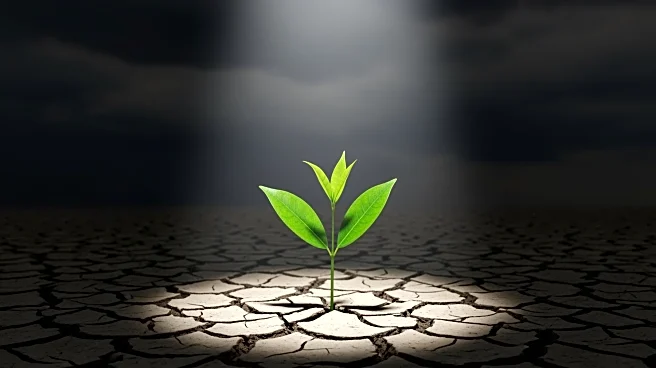What's Happening?
A recent United Nations report has revealed that global efforts to combat climate change have made only slight progress, falling short of the necessary measures to significantly reduce future warming.
The report, part of the UN Environment Program's Emissions Gap analysis, indicates that the latest climate action plans submitted by countries under the 2015 Paris Agreement have only marginally improved projections for global temperature increases. The report also highlights the impact of the United States' withdrawal from the Paris Agreement, which has counteracted some of the progress made by other nations. The report underscores the urgency of more aggressive action to curb greenhouse gas emissions, as current policies are projected to lead to a global temperature rise of 2.8 degrees Celsius by the end of the century.
Why It's Important?
The findings of the UN report are significant as they underscore the gap between current climate policies and the targets set by the Paris Agreement. The projected temperature rise poses a threat to vulnerable communities and ecosystems, with potential consequences including more frequent heatwaves, ocean heat waves, and rising sea levels. The report calls for immediate and substantial reductions in emissions to prevent catastrophic climate impacts. The United States' withdrawal from the Paris Agreement is particularly concerning, as it was previously one of the largest contributors to global emission reduction efforts. The report serves as a call to action for nations to enhance their climate commitments and implement more effective policies to mitigate climate change.
What's Next?
The report sets the stage for upcoming UN climate talks in Belem, Brazil, where nations will be urged to strengthen their climate commitments. The international community will need to address the shortfall in emission reductions and explore strategies to accelerate the transition to renewable energy sources. The report also highlights the need for increased collaboration and support for developing countries to enhance their climate resilience. As the world approaches critical temperature thresholds, the pressure on governments to act decisively will intensify, with potential implications for international relations and economic policies.
Beyond the Headlines
The report raises ethical and legal questions about the responsibility of nations to address climate change and the potential consequences of inaction. It also highlights the role of political will in driving climate policy and the challenges of balancing economic growth with environmental sustainability. The findings may influence public opinion and advocacy efforts, as citizens and organizations push for more ambitious climate action. The report also underscores the importance of scientific research and data in informing policy decisions and tracking progress towards climate goals.








